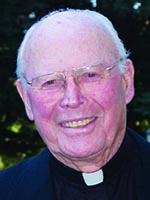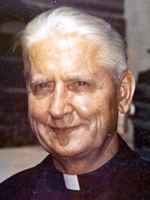Priestly Ministry in Times of Crisis and Trial
Insights from a priest who was present at the Pentagon on 9/11, a U.S. military chaplain and a colleague of Fr. Walter Ciszek

It’s often said that times of severe trial or crisis really reveal the mettle of a man. I spoke with two priests who exercised their ministry during such times, and a third who was a close friend of such a priest to ask them about their experiences.
* * * *
On morning of Sept. 11, 2001, Fr. Stephen McGraw, a newly ordained priest for the Diocese of Arlington, was driving to Arlington National Cemetery for a graveside service. He found himself in standstill traffic in front of the Pentagon, which is near the cemetery. He had not been listening to the news, and was unaware that al-Qaida hijackers had commandeered airplanes and flown them into the World Trade Center towers in New York City. His only concern at the moment was that he’d be late for the service.
At 9:43 a.m., he heard and felt the rush of a jet aircraft flying in low over the tops of the cars on the roadway, and looked to his right and saw a large aircraft “disappear” into the Pentagon. His thoughts flashed back to the 1982 crash of Air Florida Flight 90 into the 14th Street Bridge over Washington’s Potomac River, and he assumed this was another such large scale accident. (It wasn’t until afterward that he realized the plane came into the Pentagon in a controlled way, as if for a landing.)
As the cars were not moving, he easily exited his vehicle, bringing his stole, oils for anointing and his “green book” of prayers for the sick and dying. As he reached the Pentagon lawn, injured victims were being brought out for treatment. He went from one victim to another, offering the Sacrament of Anointing of the Sick to Catholics; to others, he’d simply say “Jesus is with you.”
He recalled one woman who was badly burned pleading with rescuers to remove her shoe which was causing her pain. Father removed the shoe, and she said, “Tell my mother and father that I love them.” She later died.
Reflecting later on the day, Fr. McGraw said, “It was an overwhelming experience of God’s providence. He used a priest, which happened to be me, to be a sign of His presence in the midst of tragedy and chaos.”
He continued, “It was like being present at Calvary: the innocent Victim, His terrible suffering and the terrible sin against God. It was the power of the Cross, bringing good out of terrible suffering.”

Father was ordained a priest for the Archdiocese of San Francisco in 1948. He volunteered to join the U.S. Army after the outbreak of the Korean War. The infantry units in which he served, both in Korea and Vietnam, often found themselves in the thick of the fighting. Father was repeatedly advised to return to the safer rear areas, but he wanted to be on the front lines with the troops.
He explained, “That’s how we serve as priests. It’s part of our nature. We have to go where the suffering and dying is.”
The strains of war can be tremendous, Fr. Davenport said, but God’s grace can help you endure. He recalled one incident, serving with soldiers protecting a water plant in Saigon, Vietnam. He was suffering from food poisoning, but since his unit was expecting an artillery attack that night, he opted to stay rather than go to the hospital.
At 3 a.m., the North Vietnamese barrage hit (“all hell broke loose!”) Casualties were high, and Father went about ministering to the wounded and dying, pausing from time to time to vomit because of his illness. The next day, he celebrated nine Masses. His only “food” for the day was a can of Coke, which it took him eight hours to get down. He reflected, “I don’t know how I did it, but God takes care of you.”
Despite his many times in combat, Father made it through unscathed. Once on the battlefield, an artillery shell exploded nearby, sending a piece of shrapnel tearing through his fatigues. But he was left uninjured. The experience helped earn him the title of “Father Lucky.”
Another incident he recalled was when his driver, who had not yet experienced combat, took him to the front lines. While speaking to some tank crews, some artillery rounds came in. Father asked his driver, “Are you scared?” He replied, “Not when I’m with Father Lucky.” Father responded, “Well, I am. Let’s get the hell out of here!”
Fr. Davenport believed in the saying, “there are no atheists in foxholes.” Soldiers fighting and dying were often receptive to his ministry; some wore rosaries he had given them around their necks into battle.
The Catholic chaplain shortage was always a problem; seven Protestant chaplains ministered to the same number of men he did. He had spent enough time in combat to earn a ticket home, but opted to stay with the troops until the end of both wars because “there was no one to replace me.”
Father served at parishes in the San Francisco Bay area after the war, including the Church of the Nativity in Menlo Park, California. He died at a San Rafael retirement home in 2014. Shortly before his death, he related his fond memories of his time in the service. While he conceded that war is “terrible and stupid,” he noted that the work of a military chaplain is “beautiful.”
He continued, “You hold wounded and dying kids in your arms, 18 or 19 years old, some calling out for their mothers. I told them not to be afraid, and talked to them about Jesus and Mary. My time in the military was the most important part of my priesthood.”

Fr. Brian Van Hove, SJ, lived for two years with Fr. Ciszek in a Jesuit community in the Bronx, New York, and was interviewed as a part of Fr. Ciszek’s cause for canonization. Fr. Ciszek told him that “I should have died 20 different times in the Soviet Union, but God had something for me to do.”
Fr. Van Hove remembers Fr. Ciszek as a cheerful, upbeat, good-natured man, “with piercing blue eyes that could penetrate your soul.” He had an outgoing personality; Father remembers how Ciszek would organize the children of the Bronx into groups with a whistle and lead them in games.
Russia was a “mad slaughterhouse” during Fr. Ciszek’s years there (1940-63), Fr. Van Hove explained, and Father saw bloodshed and brutality firsthand. In one incident Fr. Ciszek relates in With God in Russia, Father and his fellow prisoners were crammed into the hold of a ship steaming upriver to the work camps in Siberia. Some prisoners rioted due to the poor conditions, and the guards machined gunned many and threw their bodies in the river.
Yet despite seeing years of ugliness, Fr. Van Hove said, “Fr. Ciszek didn’t go into despair or depression. He believed God had a purpose for him to be where he was. ”
Fr. Ciszek said that during his time in Russia, he had no access to books, and could not study. When he was able to preach or teach the Faith, he had to do so reciting religious texts from memory. When he was able to celebrate Mass, he had no Missal, but was able to do so because he had “memorized the Byzantine rite in Old Slavonic.”
During Easter, Fr. Ciszek would celebrate Midnight Mass in his small quarters as large groups “would stand outside in the snow and sing. Fr. Ciszek would then go outside and give them Communion. He was thrilled to be able to give people the sacraments.”













